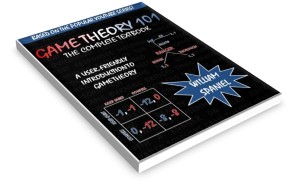This lecture looks at a rare time that weak dominance can actually be useful!
Takeaway Points
- If an individual’s preferences follow the four covered axioms (completeness, transitivity, independence, and continuity), we can represent those preferences with a numerical utility function.
- However, the utility function is not unique. Suppose a set of utilities accurately reflects a player’s preferences over outcomes. Let u be the individual’s utility for an outcome, a > 0, and b be any real number. Then converting all utilities by the transformation au + b maintains identical preferences.
- Consequently, if we take a player’s utilities from a game and convert them all by au + b, the equilibria will be the same across the games. This remains true even if we change both players’ utilities, using a different a and b for each player.
- Interestingly, the au + b transformation is the only transformation that preserves equilibria in this manner.

